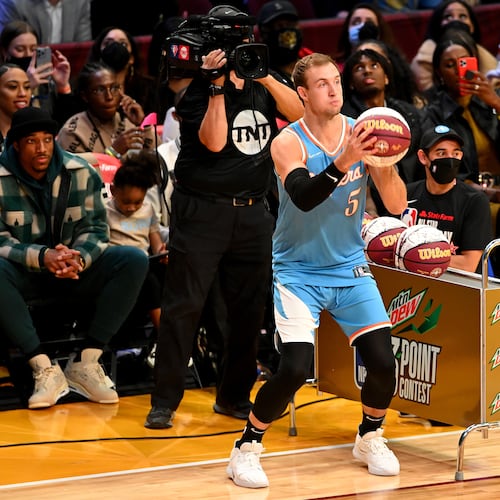This was the predictable part of the season. When a rebuilding and undersized team starts losing bodies and management opts not to throw a life preserver because winning this season just doesn’t rank as a real high on the priority list — “Let’s Go Salary Cap! Woo-hoo!” — there’s going to be a loud thud at some point.
Regulars get injured. Reserves play too many minutes. Team hits a wall.
The Hawks were north of .500 into February. They were in third place in the Eastern Conference, ahead of the deep pool of pedestrian teams that trail Indiana and Miami. Now they’ve lost 10 of their past 11 and they’re 26-31, clinging to the side of a playoff cliff. Instead of being positioned to host a playoff series (third), they’re positioned to get run over by the Pacers or Heat in the first round (eighth).
Hey, a few more games down the standings and they can spare themselves the pain, because if this slide continues nobody will have to worry about the annoying inconvenience of playoff games between the end of the regular season and the draft.
Which leads to a question: Does anybody care?
I’ve never witnessed a situation where the bottom so completely fell out of a team’s season, and it was met by nothing by yawns. (Also empty seats.)
Hawks fan(s) must not care because most of the meltdown emails I’ve been receiving center on either the Falcons’ offseason (do something!) or Georgia’s marijuana policing (do nothing!).
General manager Danny Ferry, who has made no secret of his agenda to build slowly for the long-term, certainly isn’t consumed with his team’s spiral.
Coach Mike Budenholzer, a recent Ferry hire who has the advantage of job security, also isn’t fazed.
Players? It’s not necessarily uncommon for pro athletes, at least the well-trained ones, to refrain from griping publicly about, well, anything. But I spoke to three before the team left for its potential season-crushing, five-game West Coast trip, and not one even hinted of a lack of confidence in the team’s direction or Ferry’s decision to do nothing at the trade deadline.
The future: rainbows and lollipops.
The present: “So you’re saying I’ve got a chance …”
Guard Kyle Korver was an unrestricted free agent. He said he re-signed with the Hawks because he was sold on the team’s plan. (Also, not a lot of 32-year-olds get offered four-year contracts.)
When asked about Ferry’s decision not to seek help in the trade market, Korver said, “Obviously every team wants to bring in a big name or a big-time scorer. Fans especially want it. But this isn’t the last year they’re playing basketball. I want to be on a great team, I don’t think they could’ve brought in a piece to make us an upper-echelon team. I don’t want to sell out our future to bring in one guy who can help us go through the middle of the Eastern Conference pack. Is that worth it? It’s not worth it to me.”
Korver said he has been approached by general managers of opposing teams twice this season on the subject of the Hawks’ future.
“(One general manager) recently said, ‘Your GM is really good, and you guys are going to have a really good team here really soon,’” Korver said. “I didn’t ask for that. The guy just offered it up.”
There’s no reason to doubt Ferry or Budenholzer. Both have earned more credits than debits. Both understand they’ll ultimately be graded more on next season and the year after than this one.
Something just seems wrong with a potential playoff team being left to die on the vine. Granted, Ferry and Budenholzer could not have anticipated the injuries would continue after the trade deadline. But in a generally weak conference playoff race, a deal would’ve been a nice insurance policy for a team that seemed destined for a winnable postseason series.
Budenholzer is running out of healthy bodies and combinations. He has used 12 different lineups in 28 games since Al Horford was injured.
“Losing is no fun — not for Bud, not for our players,” Ferry said. “But I think our group likes playing together. They know we’re not getting Al back, or Gustavo (Ayon) back or (John) Jenkins back. I’m sure everybody wants to add a player. But at the same time nobody wants to be traded for that player.”
He again defended his deadline stance, saying: “We made the decision to not go for any quick fixes and look at the broader picture of what we’re trying to do from a program standpoint. We weren’t looking to sacrifice things for just an immediate gain.”
Instead of short-term gain, they get short-term pain. And everybody seems quite fine with that.
About the Author
Keep Reading
The Latest
Featured

